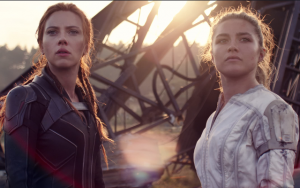BLACK WIDOW: 3 STARS. “eye-scorching action and themes of the importance of family.”
 If you were to make a Venn diagram of “Black Widow,” now on Disney+ with premium access, and the recent animated film “The Boss Baby: Family Business,” you’d be surprised by the overlap. Both movies are about estranged families coming together and siblings finding a path forward after years of bitter feelings. One is much louder than the other, but underneath it all they are both all about family. “I chose to go west and become an Avenger,” Natasha Romanoff (Scarlett Johansson) says. “They treated me like family.”
If you were to make a Venn diagram of “Black Widow,” now on Disney+ with premium access, and the recent animated film “The Boss Baby: Family Business,” you’d be surprised by the overlap. Both movies are about estranged families coming together and siblings finding a path forward after years of bitter feelings. One is much louder than the other, but underneath it all they are both all about family. “I chose to go west and become an Avenger,” Natasha Romanoff (Scarlett Johansson) says. “They treated me like family.”
The story begins with a flashback.
It’s 1995 and sisters Natasha (played as a child by Ever Anderson) and Yelena (Violet McGraw) are separated from their Soviet sleeper cell family in Ohio. Removed from their undercover agent parents, scientist mother Melina (Rachel Weisz) and super-soldier father Alexei (David Harbour), they are placed under the supervision of evil Soviet General Dreykov (Ray Winston) in a training camp called the Red Room where they are brainwashed and taught the deadly ways of the Widows.
Jump forward twenty-one years to the gap between the events of “Captain America: Civil War” and “Infinity War.” Natasha (Johansson) is cut loose from her Avengers pals after breaking the Sokovia Accords. The superhero clan have gotten “divorced,” and Natasha is hiding out in Norway. When she is attacked by Dreykov’s bodyguard, the mysterious Taskmaster, she reunites with her estranged “family” to take on the Russian general.
“Black Widow,” the first Marvel Cinematic Universe solo outing for Johansson’s character, has spent a year bouncing around the pandemic release schedule and brings with it high expectations from fans.
Directed by Cate Shortland, Romanoff’s convoluted backstory is handled in a fairly straightforward way, part Marvel, part “The Americans.” The movie does offer up a fair amount of fan service but still provides eye-scorching action and basic, relatable themes of the importance of family and responsibility for the casual viewer.
Despite the wild CGI action and Jason Bourne style one-on-one combat, the film feels more grounded than most other Marvel movies. Perhaps it’s because Natasha and Yelena (Florence Pugh) don’t have super powers (although they are VERY resilient) or perhaps it’s because the story details the dysfunctional, tragic past that put Natasha on the road to becoming an assassin or maybe it’s because the villain Dreykov barely makes an impression, but the usual stakes—saving the world—take a backseat to more personal concerns.
“Black Widow” is a swansong for Natasha. The character jumped off a cliff in “Avengers: Endgame,” sacrificing herself so her superhero buddies could acquire the Soul Stone and help defeat genocidal warlord Thanos. Johansson sends her off with a suitably steely yet vulnerable performance, and when she isn’t running, jumping, punching or shooting, she brings some real humanity to the quieter scenes.
Pugh and Harbour bring some much-welcomed levity, the former as the eye-rolling sarcastic younger sister, the latter as the insecure wannabe super soldier who is just a bit too concerned about his legacy. Their bickering and subtle character touches help add life to the family vibe so important to the story the movie is trying to tell.
Like so many of the Marvel films, near the end “Black Widow” succumbs to overkill, noise and frenetic CGI action scenes. The family is united, à la “The Boss Baby” but the onscreen fireworks overwhelm the compelling family story that lies at the heart of Natasha’s journey.
